
Radio superstar Sheridan Whiteside is at it again, terrorizing the Ohio Stanleys, fomenting family rebellions, and scheming to get his own egomaniacal way in Actors Co-op’s pitch-perfect revival of the 1939 George S. Kaufman and Moss Hart screwball classic The Man Who Came To Dinner.
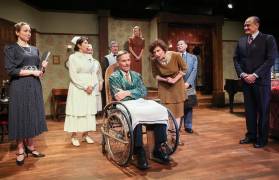 Not that Mesalia, Ohio factory owner Ernest W. Stanley (Lawrence Novikoff) and his social-climbing wife Daisy (Deborah Marlowe) weren’t initially thrilled to have the famed commentator (Greg Martin) as their dinner guest, but that was before he slipped on the ice leading up to their doorstep, threatened a $150,000 lawsuit (a whopping 2.5 mil in today’s bucks), and from his wheelchair turned their downstairs into his own personal fiefdom with private secretary Maggie Cutler (Natalie Hope MacMillan), nurse Miss Preen (Jean Kauffman), and Stanley family butler and cook (Kevin Michael Moran as John and Karen Furno as Sarah) at his ever insistent beck and call.
Not that Mesalia, Ohio factory owner Ernest W. Stanley (Lawrence Novikoff) and his social-climbing wife Daisy (Deborah Marlowe) weren’t initially thrilled to have the famed commentator (Greg Martin) as their dinner guest, but that was before he slipped on the ice leading up to their doorstep, threatened a $150,000 lawsuit (a whopping 2.5 mil in today’s bucks), and from his wheelchair turned their downstairs into his own personal fiefdom with private secretary Maggie Cutler (Natalie Hope MacMillan), nurse Miss Preen (Jean Kauffman), and Stanley family butler and cook (Kevin Michael Moran as John and Karen Furno as Sarah) at his ever insistent beck and call.
Before long, entomology professor Metz (Moran) has brought by a glass cockroach farm, Broadway diva Lorraine Sheldon (Catherine Urbanek) has gotten herself enlisted in one of Sharidan’s self-serving schemes, sophisticated English playwright Beverly Carlton (Wenzel Jones) has shown up to perform his latest Noël Cowardesque ditty, and comedy movie star Banjo (John Allee) has arrived with enough one-liners for a week’s worth of Groucho.
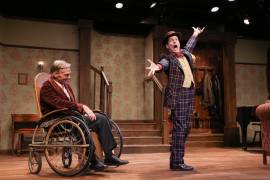 Whiteside, meanwhile, sets about encouraging the Stanleys’ early-20s offspring to disobey Daddy, son Richard (Kyle Frattini) by pursuing his dream of being a professional photographer and daughter June (Lila Hood) by accepting labor organizer Sandy’s (Chris Savell) engagement ring, while doing his most fiendish to make sure Maggie’s budding romance with handsome young Mesalia newspaper editor Bert Jefferson (Connor Sullivan) comes to naught and trying to figure out why Mr. Stanley’s dotty live-in sister Harriet’s (Brenda Ballard) face looks so familiar.
Whiteside, meanwhile, sets about encouraging the Stanleys’ early-20s offspring to disobey Daddy, son Richard (Kyle Frattini) by pursuing his dream of being a professional photographer and daughter June (Lila Hood) by accepting labor organizer Sandy’s (Chris Savell) engagement ring, while doing his most fiendish to make sure Maggie’s budding romance with handsome young Mesalia newspaper editor Bert Jefferson (Connor Sullivan) comes to naught and trying to figure out why Mr. Stanley’s dotty live-in sister Harriet’s (Brenda Ballard) face looks so familiar.
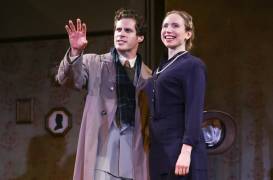 Not only that, but when it turns out that Whiteside might actually be staying with the Stanleys under false pretenses, he cajoles his attending physician (Irwin Moskowitz as Dr. Bradley) to lie on his behalf by promising to read the aspiring writer’s autobiographical novel.
Not only that, but when it turns out that Whiteside might actually be staying with the Stanleys under false pretenses, he cajoles his attending physician (Irwin Moskowitz as Dr. Bradley) to lie on his behalf by promising to read the aspiring writer’s autobiographical novel.
The names being dropped by Sheridan and his coterie (Louella Parsons, Katharine Cornell, and Hedy Lamarr among them) may be Greek to anyone too young for Social Security, but not all that much has changed over the past eight decades in our fascination with celebrity or the power that fame bestows.
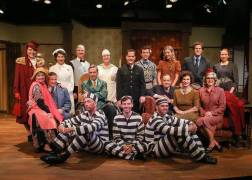 Director Linda Kerns and her production team know that for The Man Who Came To Dinner to snap, crackle, and pop, it must be 1930s all the way, from the velvet curtain that rises and falls in each of the play’s three (count’em) acts, to the two actual intermissions we’re granted Golden Age-style, to the mid-Atlantic accents de rigueur at the time, to the stunning, decade-specific costumes Shon LeBlanc has designed.
Director Linda Kerns and her production team know that for The Man Who Came To Dinner to snap, crackle, and pop, it must be 1930s all the way, from the velvet curtain that rises and falls in each of the play’s three (count’em) acts, to the two actual intermissions we’re granted Golden Age-style, to the mid-Atlantic accents de rigueur at the time, to the stunning, decade-specific costumes Shon LeBlanc has designed.
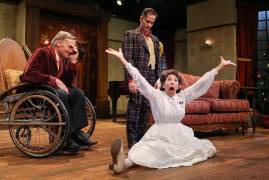 Martin’s acerbic (and perhaps not entirely heartless) Sheridan anchors the production, Novikoff, Marlowe, Hood, and Frattini providing terrific all-American Midwest support. MacMiilan’s zesty Maggie gives Whiteside as good as she gets opposite love interest Sullivan’s classic leading man charms, and Furno, Goretti da Silva, Kaufmann, Hunter Lowdon, Moran, and Savell make the comedic most of their featured and cameo roles.
Martin’s acerbic (and perhaps not entirely heartless) Sheridan anchors the production, Novikoff, Marlowe, Hood, and Frattini providing terrific all-American Midwest support. MacMiilan’s zesty Maggie gives Whiteside as good as she gets opposite love interest Sullivan’s classic leading man charms, and Furno, Goretti da Silva, Kaufmann, Hunter Lowdon, Moran, and Savell make the comedic most of their featured and cameo roles.
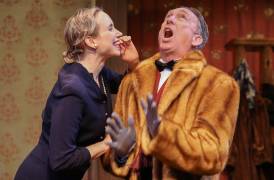 A quintet of supporting players earn the evening’s loudest and most deserved cheers—Allee’s wacky, manic Banjo; Ballard’s ditzy, dithery Harriet; Jones’s witty, urbane Beverly; Moskowitz’s delightfully daffy Dr. Bradley; and above all Urbanek’s bleached-blonde, pseudo-sophisticated, utterly delish Lorraine (whose almost-English accent is as mercurial as her moods).
A quintet of supporting players earn the evening’s loudest and most deserved cheers—Allee’s wacky, manic Banjo; Ballard’s ditzy, dithery Harriet; Jones’s witty, urbane Beverly; Moskowitz’s delightfully daffy Dr. Bradley; and above all Urbanek’s bleached-blonde, pseudo-sophisticated, utterly delish Lorraine (whose almost-English accent is as mercurial as her moods).
The Man Who Came To Dinner couldn’t look more fabulous than it does on the David Schall Theater stage with Nicholas Acciani’s just-right Midwest living room set meticulously appointed by properties designer Ernest McDaniel and vibrantly lit by Andrew Schmedake.
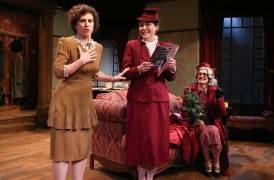 Amanda Walter’s period hair and makeup and sound designer Warren Davis’s nostalgia-inspiring sound design complete the Grade-A design mix.
Amanda Walter’s period hair and makeup and sound designer Warren Davis’s nostalgia-inspiring sound design complete the Grade-A design mix.
The Man Who Came To Dinner is produced by Thomas Chavira. Rita Cannon is stage manager and Thien Nguyen is assistant stage manager. Catriona Fray understudies the role of June.
You Can’t Take It With You may be Kaufman and Hart’s most enduring comedy classic, but their runner-up hit is well worth a revisit. At Actors Co-op, The Man Who Came To Dinner’s multitude of charms are every bit as captivating in 2017 as they were in ’39.
Actors Co-op, 1760 N. Gower St., Hollywood.
www.actorsco-op.org
–Steven Stanley
November 10, 2017
Photos: John Dlugolecki
Tags: Actors Co-op, George S. Kaufman, Los Angeles Theater Review, Moss Hart



 Since 2007, Steven Stanley's StageSceneLA.com has spotlighted the best in Southern California theater via reviews, interviews, and its annual StageSceneLA Scenies.
Since 2007, Steven Stanley's StageSceneLA.com has spotlighted the best in Southern California theater via reviews, interviews, and its annual StageSceneLA Scenies.







 COPYRIGHT 2025 STEVEN STANLEY :: DESIGN BY
COPYRIGHT 2025 STEVEN STANLEY :: DESIGN BY